NURS7013 - Alcohol Withdrawal Scale in Mental Health Literature Review
VerifiedAdded on 2023/04/24
|7
|1853
|479
Literature Review
AI Summary
This literature review provides an in-depth analysis of the Alcohol Withdrawal Scale (AWS) and its application in managing alcohol withdrawal syndrome (AWS) within mental health settings. It discusses the importance of assessment tools like CIWA-Ar and AWS in evaluating the severity of alcohol withdrawal and guiding treatment strategies. The review highlights the benefits of using AWS for assessing patients in various care settings, including general care, emergency care, and intensive care units. It also addresses the ethical considerations in studies related to alcohol withdrawal and emphasizes the need for evidence-based practice in mental health nursing. The review concludes that AWS is a valuable tool for ensuring safe detoxification and effective management of patients experiencing alcohol withdrawal, especially when integrated with standard clinical care and scientific drug trials. Desklib offers a wealth of resources, including solved assignments and past papers, to support students in their studies.
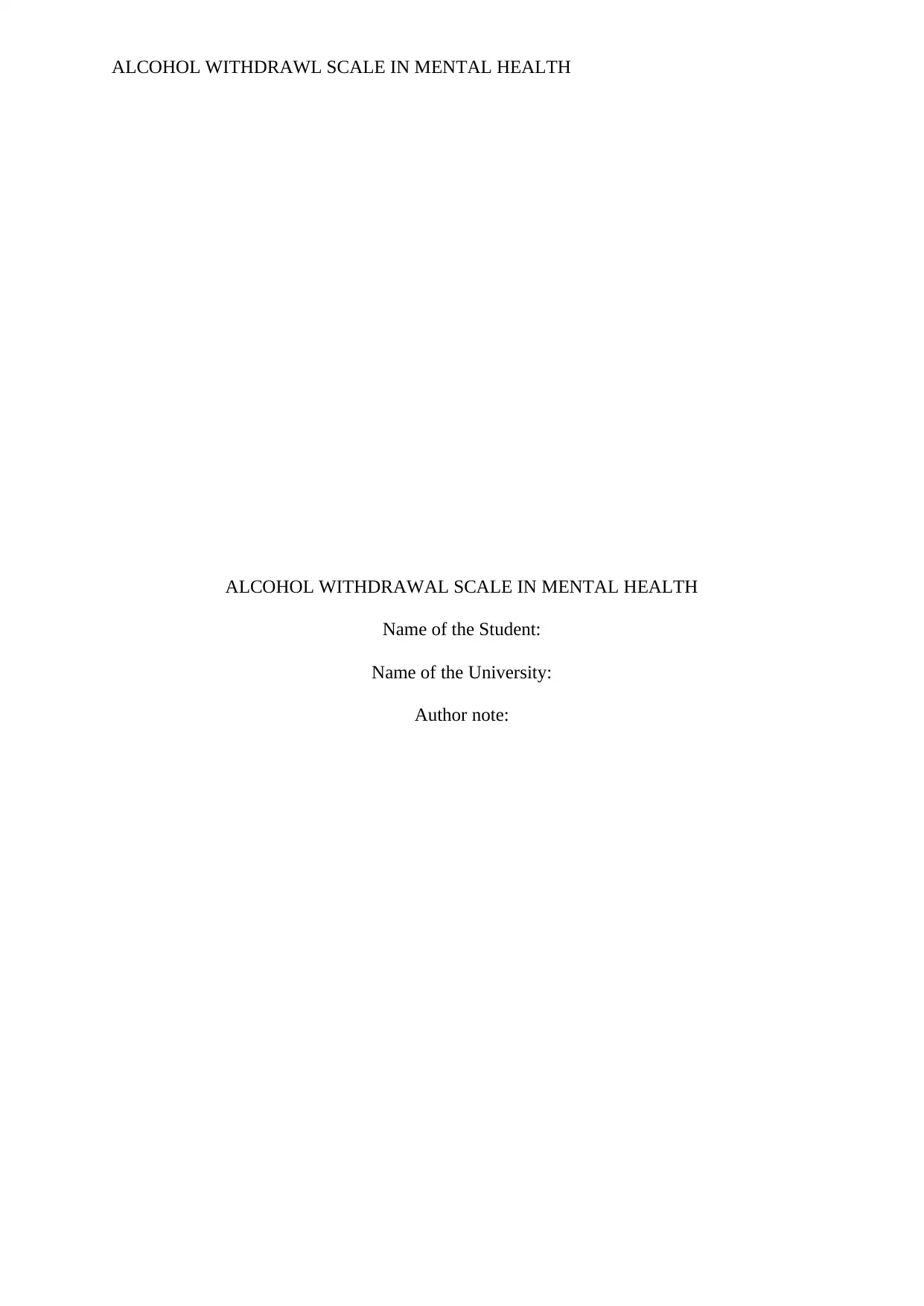
ALCOHOL WITHDRAWL SCALE IN MENTAL HEALTH
ALCOHOL WITHDRAWAL SCALE IN MENTAL HEALTH
Name of the Student:
Name of the University:
Author note:
ALCOHOL WITHDRAWAL SCALE IN MENTAL HEALTH
Name of the Student:
Name of the University:
Author note:
Paraphrase This Document
Need a fresh take? Get an instant paraphrase of this document with our AI Paraphraser
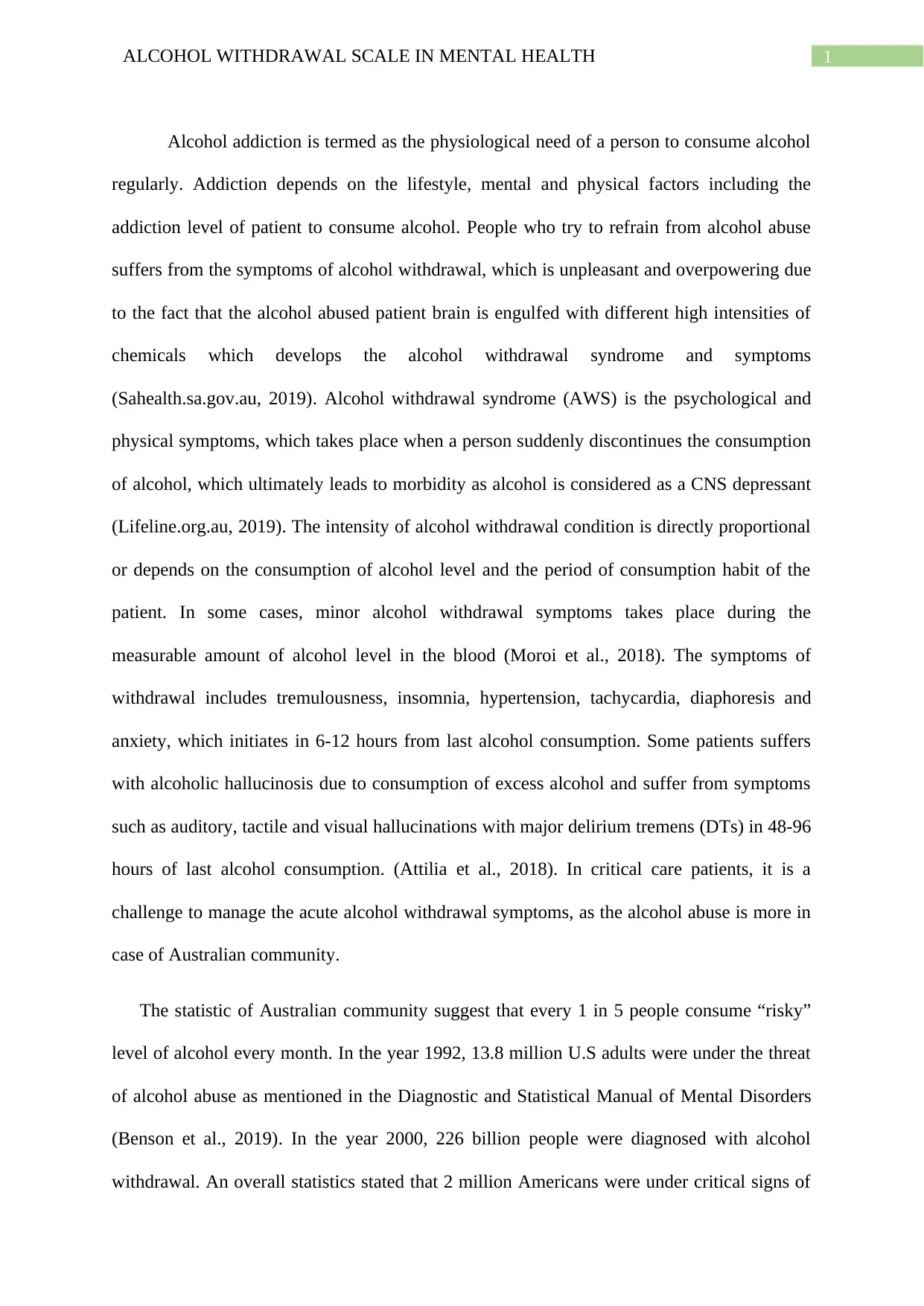
1ALCOHOL WITHDRAWAL SCALE IN MENTAL HEALTH
Alcohol addiction is termed as the physiological need of a person to consume alcohol
regularly. Addiction depends on the lifestyle, mental and physical factors including the
addiction level of patient to consume alcohol. People who try to refrain from alcohol abuse
suffers from the symptoms of alcohol withdrawal, which is unpleasant and overpowering due
to the fact that the alcohol abused patient brain is engulfed with different high intensities of
chemicals which develops the alcohol withdrawal syndrome and symptoms
(Sahealth.sa.gov.au, 2019). Alcohol withdrawal syndrome (AWS) is the psychological and
physical symptoms, which takes place when a person suddenly discontinues the consumption
of alcohol, which ultimately leads to morbidity as alcohol is considered as a CNS depressant
(Lifeline.org.au, 2019). The intensity of alcohol withdrawal condition is directly proportional
or depends on the consumption of alcohol level and the period of consumption habit of the
patient. In some cases, minor alcohol withdrawal symptoms takes place during the
measurable amount of alcohol level in the blood (Moroi et al., 2018). The symptoms of
withdrawal includes tremulousness, insomnia, hypertension, tachycardia, diaphoresis and
anxiety, which initiates in 6-12 hours from last alcohol consumption. Some patients suffers
with alcoholic hallucinosis due to consumption of excess alcohol and suffer from symptoms
such as auditory, tactile and visual hallucinations with major delirium tremens (DTs) in 48-96
hours of last alcohol consumption. (Attilia et al., 2018). In critical care patients, it is a
challenge to manage the acute alcohol withdrawal symptoms, as the alcohol abuse is more in
case of Australian community.
The statistic of Australian community suggest that every 1 in 5 people consume “risky”
level of alcohol every month. In the year 1992, 13.8 million U.S adults were under the threat
of alcohol abuse as mentioned in the Diagnostic and Statistical Manual of Mental Disorders
(Benson et al., 2019). In the year 2000, 226 billion people were diagnosed with alcohol
withdrawal. An overall statistics stated that 2 million Americans were under critical signs of
Alcohol addiction is termed as the physiological need of a person to consume alcohol
regularly. Addiction depends on the lifestyle, mental and physical factors including the
addiction level of patient to consume alcohol. People who try to refrain from alcohol abuse
suffers from the symptoms of alcohol withdrawal, which is unpleasant and overpowering due
to the fact that the alcohol abused patient brain is engulfed with different high intensities of
chemicals which develops the alcohol withdrawal syndrome and symptoms
(Sahealth.sa.gov.au, 2019). Alcohol withdrawal syndrome (AWS) is the psychological and
physical symptoms, which takes place when a person suddenly discontinues the consumption
of alcohol, which ultimately leads to morbidity as alcohol is considered as a CNS depressant
(Lifeline.org.au, 2019). The intensity of alcohol withdrawal condition is directly proportional
or depends on the consumption of alcohol level and the period of consumption habit of the
patient. In some cases, minor alcohol withdrawal symptoms takes place during the
measurable amount of alcohol level in the blood (Moroi et al., 2018). The symptoms of
withdrawal includes tremulousness, insomnia, hypertension, tachycardia, diaphoresis and
anxiety, which initiates in 6-12 hours from last alcohol consumption. Some patients suffers
with alcoholic hallucinosis due to consumption of excess alcohol and suffer from symptoms
such as auditory, tactile and visual hallucinations with major delirium tremens (DTs) in 48-96
hours of last alcohol consumption. (Attilia et al., 2018). In critical care patients, it is a
challenge to manage the acute alcohol withdrawal symptoms, as the alcohol abuse is more in
case of Australian community.
The statistic of Australian community suggest that every 1 in 5 people consume “risky”
level of alcohol every month. In the year 1992, 13.8 million U.S adults were under the threat
of alcohol abuse as mentioned in the Diagnostic and Statistical Manual of Mental Disorders
(Benson et al., 2019). In the year 2000, 226 billion people were diagnosed with alcohol
withdrawal. An overall statistics stated that 2 million Americans were under critical signs of
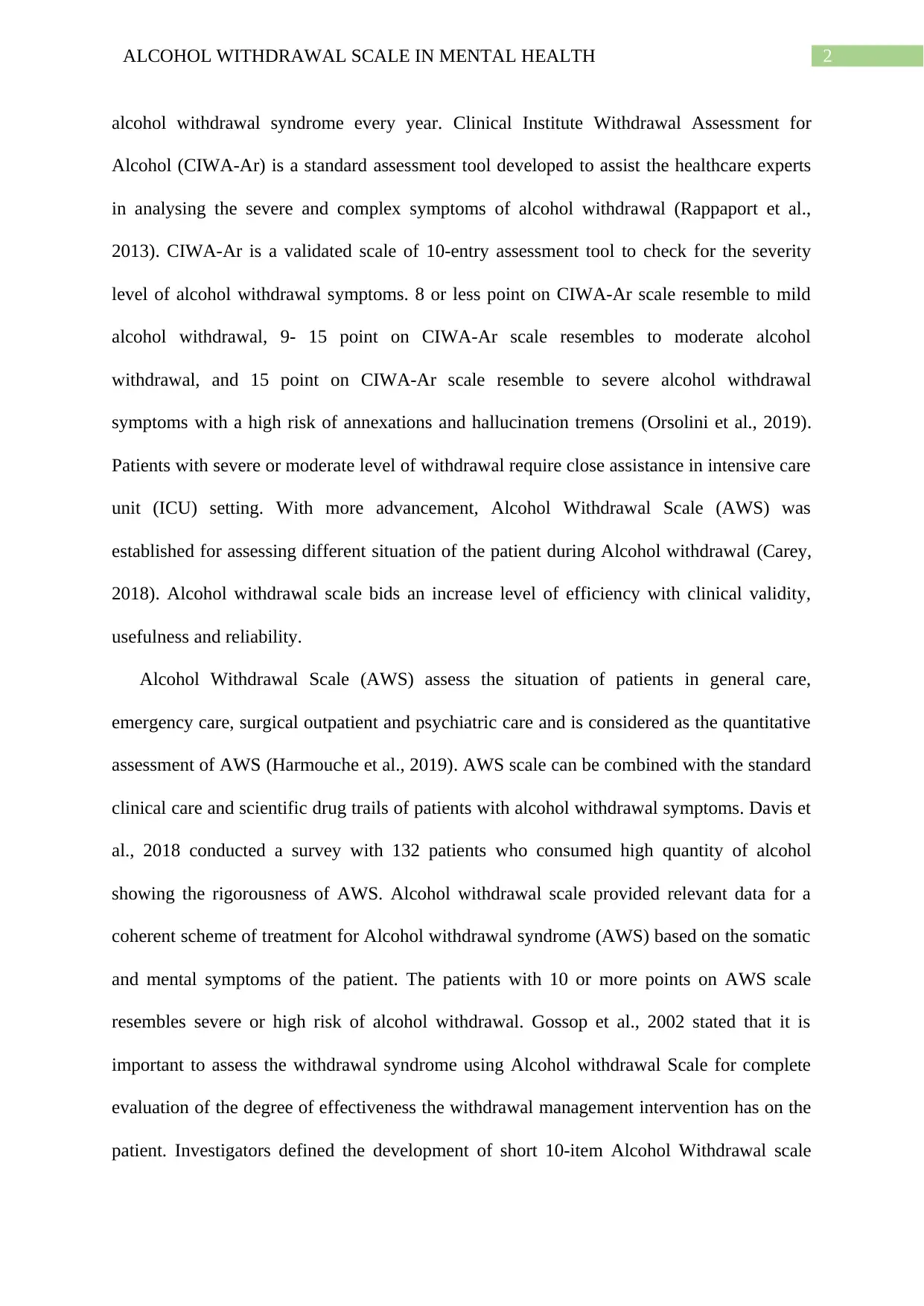
2ALCOHOL WITHDRAWAL SCALE IN MENTAL HEALTH
alcohol withdrawal syndrome every year. Clinical Institute Withdrawal Assessment for
Alcohol (CIWA-Ar) is a standard assessment tool developed to assist the healthcare experts
in analysing the severe and complex symptoms of alcohol withdrawal (Rappaport et al.,
2013). CIWA-Ar is a validated scale of 10-entry assessment tool to check for the severity
level of alcohol withdrawal symptoms. 8 or less point on CIWA-Ar scale resemble to mild
alcohol withdrawal, 9- 15 point on CIWA-Ar scale resembles to moderate alcohol
withdrawal, and 15 point on CIWA-Ar scale resemble to severe alcohol withdrawal
symptoms with a high risk of annexations and hallucination tremens (Orsolini et al., 2019).
Patients with severe or moderate level of withdrawal require close assistance in intensive care
unit (ICU) setting. With more advancement, Alcohol Withdrawal Scale (AWS) was
established for assessing different situation of the patient during Alcohol withdrawal (Carey,
2018). Alcohol withdrawal scale bids an increase level of efficiency with clinical validity,
usefulness and reliability.
Alcohol Withdrawal Scale (AWS) assess the situation of patients in general care,
emergency care, surgical outpatient and psychiatric care and is considered as the quantitative
assessment of AWS (Harmouche et al., 2019). AWS scale can be combined with the standard
clinical care and scientific drug trails of patients with alcohol withdrawal symptoms. Davis et
al., 2018 conducted a survey with 132 patients who consumed high quantity of alcohol
showing the rigorousness of AWS. Alcohol withdrawal scale provided relevant data for a
coherent scheme of treatment for Alcohol withdrawal syndrome (AWS) based on the somatic
and mental symptoms of the patient. The patients with 10 or more points on AWS scale
resembles severe or high risk of alcohol withdrawal. Gossop et al., 2002 stated that it is
important to assess the withdrawal syndrome using Alcohol withdrawal Scale for complete
evaluation of the degree of effectiveness the withdrawal management intervention has on the
patient. Investigators defined the development of short 10-item Alcohol Withdrawal scale
alcohol withdrawal syndrome every year. Clinical Institute Withdrawal Assessment for
Alcohol (CIWA-Ar) is a standard assessment tool developed to assist the healthcare experts
in analysing the severe and complex symptoms of alcohol withdrawal (Rappaport et al.,
2013). CIWA-Ar is a validated scale of 10-entry assessment tool to check for the severity
level of alcohol withdrawal symptoms. 8 or less point on CIWA-Ar scale resemble to mild
alcohol withdrawal, 9- 15 point on CIWA-Ar scale resembles to moderate alcohol
withdrawal, and 15 point on CIWA-Ar scale resemble to severe alcohol withdrawal
symptoms with a high risk of annexations and hallucination tremens (Orsolini et al., 2019).
Patients with severe or moderate level of withdrawal require close assistance in intensive care
unit (ICU) setting. With more advancement, Alcohol Withdrawal Scale (AWS) was
established for assessing different situation of the patient during Alcohol withdrawal (Carey,
2018). Alcohol withdrawal scale bids an increase level of efficiency with clinical validity,
usefulness and reliability.
Alcohol Withdrawal Scale (AWS) assess the situation of patients in general care,
emergency care, surgical outpatient and psychiatric care and is considered as the quantitative
assessment of AWS (Harmouche et al., 2019). AWS scale can be combined with the standard
clinical care and scientific drug trails of patients with alcohol withdrawal symptoms. Davis et
al., 2018 conducted a survey with 132 patients who consumed high quantity of alcohol
showing the rigorousness of AWS. Alcohol withdrawal scale provided relevant data for a
coherent scheme of treatment for Alcohol withdrawal syndrome (AWS) based on the somatic
and mental symptoms of the patient. The patients with 10 or more points on AWS scale
resembles severe or high risk of alcohol withdrawal. Gossop et al., 2002 stated that it is
important to assess the withdrawal syndrome using Alcohol withdrawal Scale for complete
evaluation of the degree of effectiveness the withdrawal management intervention has on the
patient. Investigators defined the development of short 10-item Alcohol Withdrawal scale
⊘ This is a preview!⊘
Do you want full access?
Subscribe today to unlock all pages.

Trusted by 1+ million students worldwide
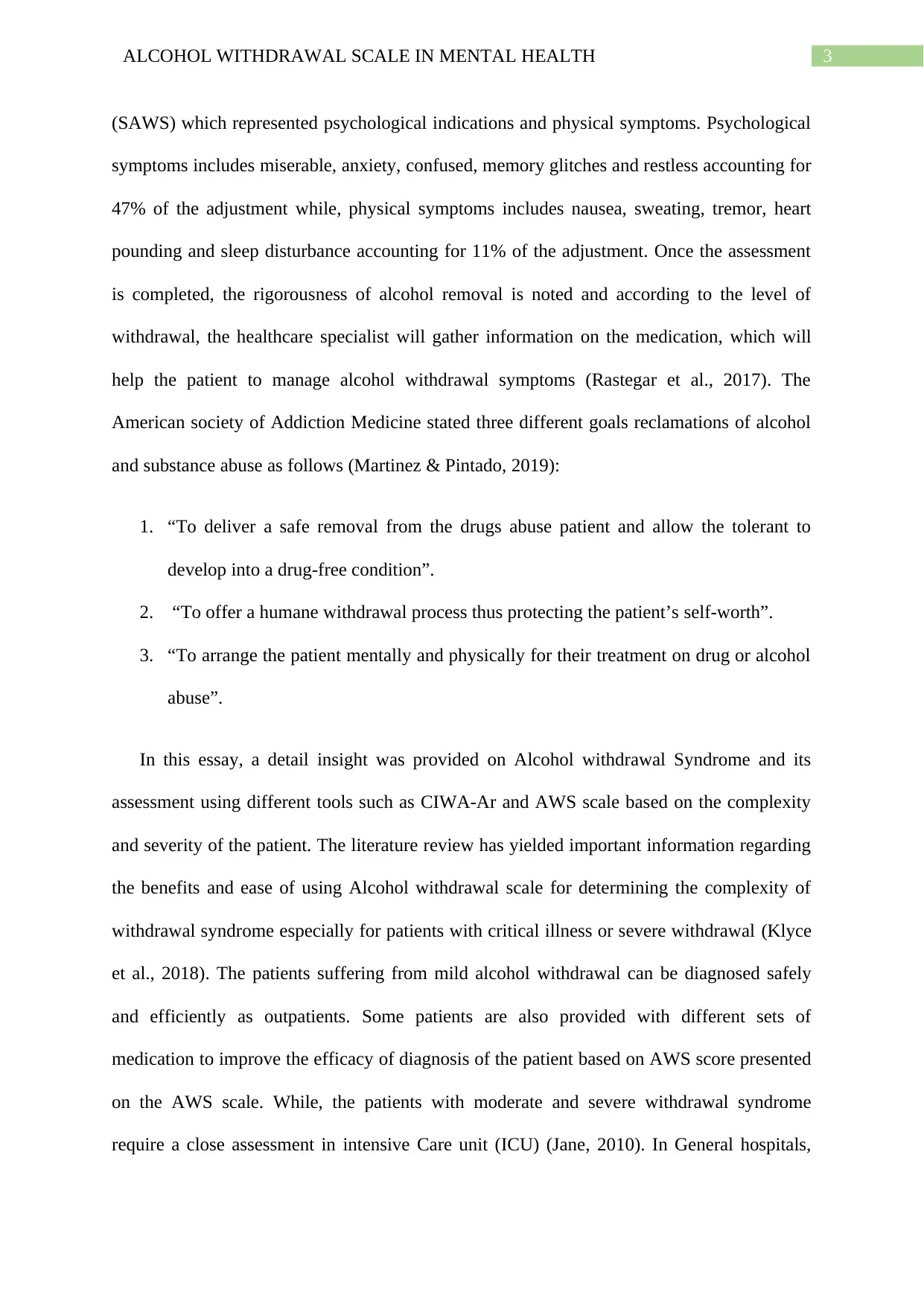
3ALCOHOL WITHDRAWAL SCALE IN MENTAL HEALTH
(SAWS) which represented psychological indications and physical symptoms. Psychological
symptoms includes miserable, anxiety, confused, memory glitches and restless accounting for
47% of the adjustment while, physical symptoms includes nausea, sweating, tremor, heart
pounding and sleep disturbance accounting for 11% of the adjustment. Once the assessment
is completed, the rigorousness of alcohol removal is noted and according to the level of
withdrawal, the healthcare specialist will gather information on the medication, which will
help the patient to manage alcohol withdrawal symptoms (Rastegar et al., 2017). The
American society of Addiction Medicine stated three different goals reclamations of alcohol
and substance abuse as follows (Martinez & Pintado, 2019):
1. “To deliver a safe removal from the drugs abuse patient and allow the tolerant to
develop into a drug-free condition”.
2. “To offer a humane withdrawal process thus protecting the patient’s self-worth”.
3. “To arrange the patient mentally and physically for their treatment on drug or alcohol
abuse”.
In this essay, a detail insight was provided on Alcohol withdrawal Syndrome and its
assessment using different tools such as CIWA-Ar and AWS scale based on the complexity
and severity of the patient. The literature review has yielded important information regarding
the benefits and ease of using Alcohol withdrawal scale for determining the complexity of
withdrawal syndrome especially for patients with critical illness or severe withdrawal (Klyce
et al., 2018). The patients suffering from mild alcohol withdrawal can be diagnosed safely
and efficiently as outpatients. Some patients are also provided with different sets of
medication to improve the efficacy of diagnosis of the patient based on AWS score presented
on the AWS scale. While, the patients with moderate and severe withdrawal syndrome
require a close assessment in intensive Care unit (ICU) (Jane, 2010). In General hospitals,
(SAWS) which represented psychological indications and physical symptoms. Psychological
symptoms includes miserable, anxiety, confused, memory glitches and restless accounting for
47% of the adjustment while, physical symptoms includes nausea, sweating, tremor, heart
pounding and sleep disturbance accounting for 11% of the adjustment. Once the assessment
is completed, the rigorousness of alcohol removal is noted and according to the level of
withdrawal, the healthcare specialist will gather information on the medication, which will
help the patient to manage alcohol withdrawal symptoms (Rastegar et al., 2017). The
American society of Addiction Medicine stated three different goals reclamations of alcohol
and substance abuse as follows (Martinez & Pintado, 2019):
1. “To deliver a safe removal from the drugs abuse patient and allow the tolerant to
develop into a drug-free condition”.
2. “To offer a humane withdrawal process thus protecting the patient’s self-worth”.
3. “To arrange the patient mentally and physically for their treatment on drug or alcohol
abuse”.
In this essay, a detail insight was provided on Alcohol withdrawal Syndrome and its
assessment using different tools such as CIWA-Ar and AWS scale based on the complexity
and severity of the patient. The literature review has yielded important information regarding
the benefits and ease of using Alcohol withdrawal scale for determining the complexity of
withdrawal syndrome especially for patients with critical illness or severe withdrawal (Klyce
et al., 2018). The patients suffering from mild alcohol withdrawal can be diagnosed safely
and efficiently as outpatients. Some patients are also provided with different sets of
medication to improve the efficacy of diagnosis of the patient based on AWS score presented
on the AWS scale. While, the patients with moderate and severe withdrawal syndrome
require a close assessment in intensive Care unit (ICU) (Jane, 2010). In General hospitals,
Paraphrase This Document
Need a fresh take? Get an instant paraphrase of this document with our AI Paraphraser
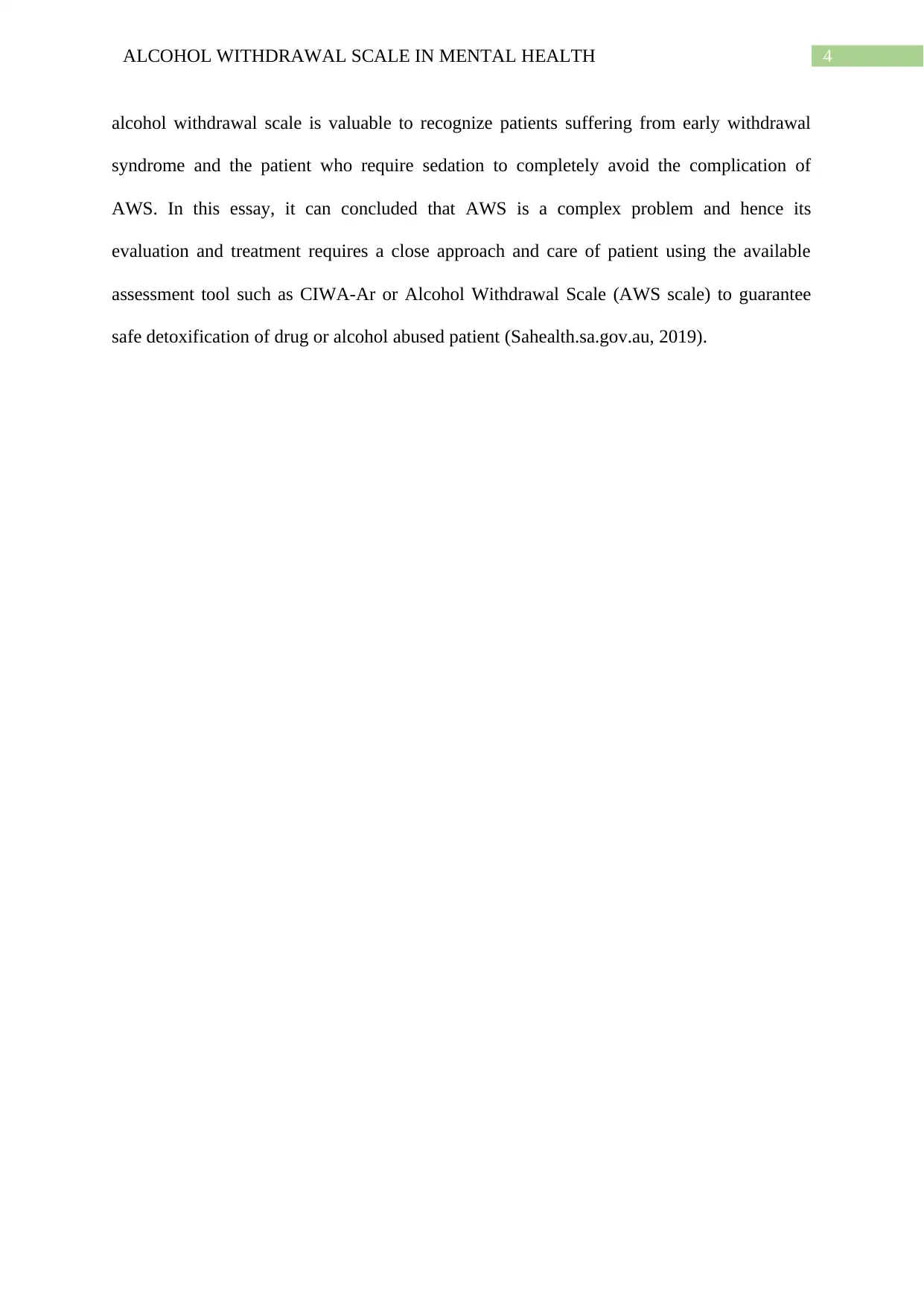
4ALCOHOL WITHDRAWAL SCALE IN MENTAL HEALTH
alcohol withdrawal scale is valuable to recognize patients suffering from early withdrawal
syndrome and the patient who require sedation to completely avoid the complication of
AWS. In this essay, it can concluded that AWS is a complex problem and hence its
evaluation and treatment requires a close approach and care of patient using the available
assessment tool such as CIWA-Ar or Alcohol Withdrawal Scale (AWS scale) to guarantee
safe detoxification of drug or alcohol abused patient (Sahealth.sa.gov.au, 2019).
alcohol withdrawal scale is valuable to recognize patients suffering from early withdrawal
syndrome and the patient who require sedation to completely avoid the complication of
AWS. In this essay, it can concluded that AWS is a complex problem and hence its
evaluation and treatment requires a close approach and care of patient using the available
assessment tool such as CIWA-Ar or Alcohol Withdrawal Scale (AWS scale) to guarantee
safe detoxification of drug or alcohol abused patient (Sahealth.sa.gov.au, 2019).
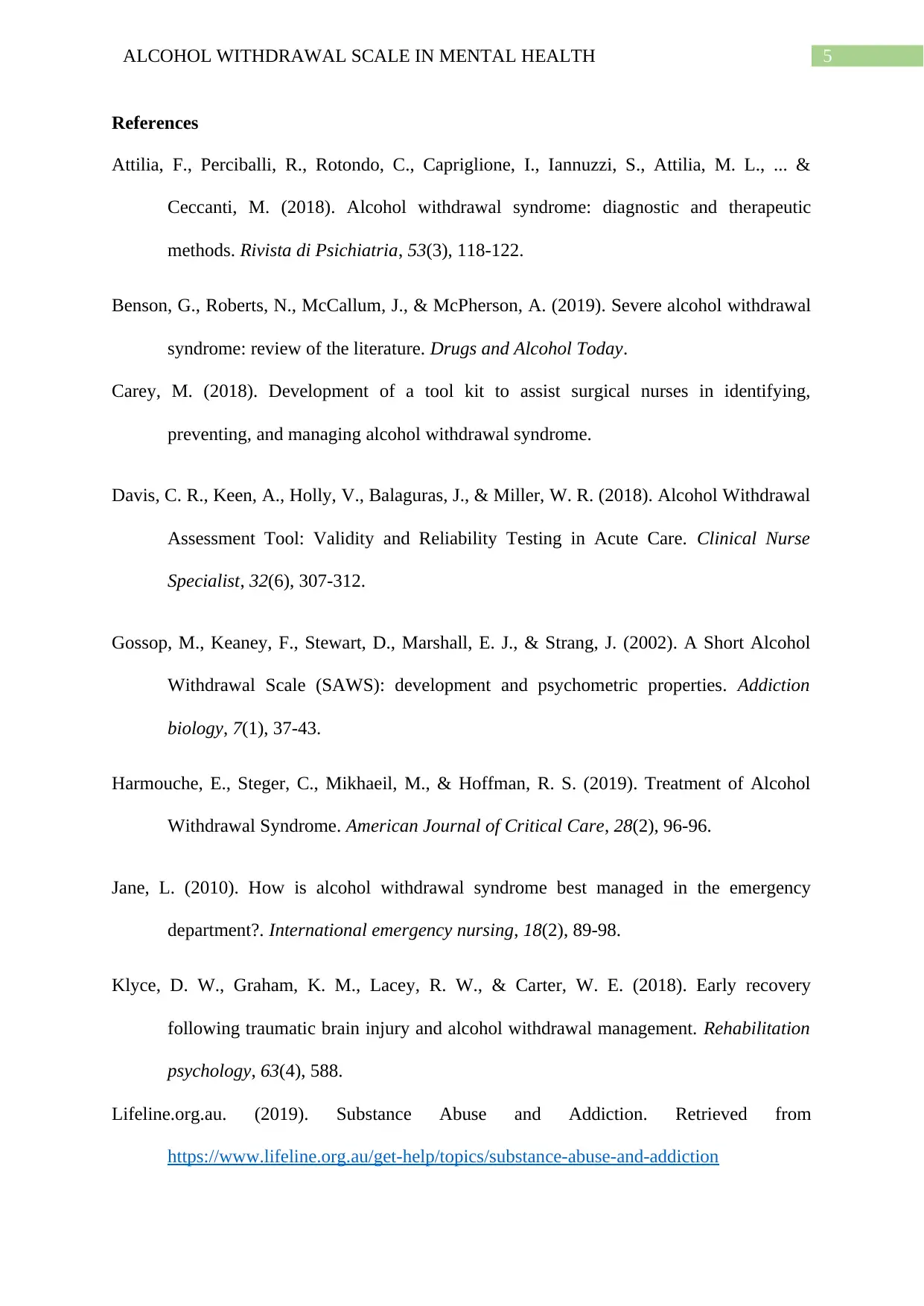
5ALCOHOL WITHDRAWAL SCALE IN MENTAL HEALTH
References
Attilia, F., Perciballi, R., Rotondo, C., Capriglione, I., Iannuzzi, S., Attilia, M. L., ... &
Ceccanti, M. (2018). Alcohol withdrawal syndrome: diagnostic and therapeutic
methods. Rivista di Psichiatria, 53(3), 118-122.
Benson, G., Roberts, N., McCallum, J., & McPherson, A. (2019). Severe alcohol withdrawal
syndrome: review of the literature. Drugs and Alcohol Today.
Carey, M. (2018). Development of a tool kit to assist surgical nurses in identifying,
preventing, and managing alcohol withdrawal syndrome.
Davis, C. R., Keen, A., Holly, V., Balaguras, J., & Miller, W. R. (2018). Alcohol Withdrawal
Assessment Tool: Validity and Reliability Testing in Acute Care. Clinical Nurse
Specialist, 32(6), 307-312.
Gossop, M., Keaney, F., Stewart, D., Marshall, E. J., & Strang, J. (2002). A Short Alcohol
Withdrawal Scale (SAWS): development and psychometric properties. Addiction
biology, 7(1), 37-43.
Harmouche, E., Steger, C., Mikhaeil, M., & Hoffman, R. S. (2019). Treatment of Alcohol
Withdrawal Syndrome. American Journal of Critical Care, 28(2), 96-96.
Jane, L. (2010). How is alcohol withdrawal syndrome best managed in the emergency
department?. International emergency nursing, 18(2), 89-98.
Klyce, D. W., Graham, K. M., Lacey, R. W., & Carter, W. E. (2018). Early recovery
following traumatic brain injury and alcohol withdrawal management. Rehabilitation
psychology, 63(4), 588.
Lifeline.org.au. (2019). Substance Abuse and Addiction. Retrieved from
https://www.lifeline.org.au/get-help/topics/substance-abuse-and-addiction
References
Attilia, F., Perciballi, R., Rotondo, C., Capriglione, I., Iannuzzi, S., Attilia, M. L., ... &
Ceccanti, M. (2018). Alcohol withdrawal syndrome: diagnostic and therapeutic
methods. Rivista di Psichiatria, 53(3), 118-122.
Benson, G., Roberts, N., McCallum, J., & McPherson, A. (2019). Severe alcohol withdrawal
syndrome: review of the literature. Drugs and Alcohol Today.
Carey, M. (2018). Development of a tool kit to assist surgical nurses in identifying,
preventing, and managing alcohol withdrawal syndrome.
Davis, C. R., Keen, A., Holly, V., Balaguras, J., & Miller, W. R. (2018). Alcohol Withdrawal
Assessment Tool: Validity and Reliability Testing in Acute Care. Clinical Nurse
Specialist, 32(6), 307-312.
Gossop, M., Keaney, F., Stewart, D., Marshall, E. J., & Strang, J. (2002). A Short Alcohol
Withdrawal Scale (SAWS): development and psychometric properties. Addiction
biology, 7(1), 37-43.
Harmouche, E., Steger, C., Mikhaeil, M., & Hoffman, R. S. (2019). Treatment of Alcohol
Withdrawal Syndrome. American Journal of Critical Care, 28(2), 96-96.
Jane, L. (2010). How is alcohol withdrawal syndrome best managed in the emergency
department?. International emergency nursing, 18(2), 89-98.
Klyce, D. W., Graham, K. M., Lacey, R. W., & Carter, W. E. (2018). Early recovery
following traumatic brain injury and alcohol withdrawal management. Rehabilitation
psychology, 63(4), 588.
Lifeline.org.au. (2019). Substance Abuse and Addiction. Retrieved from
https://www.lifeline.org.au/get-help/topics/substance-abuse-and-addiction
⊘ This is a preview!⊘
Do you want full access?
Subscribe today to unlock all pages.

Trusted by 1+ million students worldwide
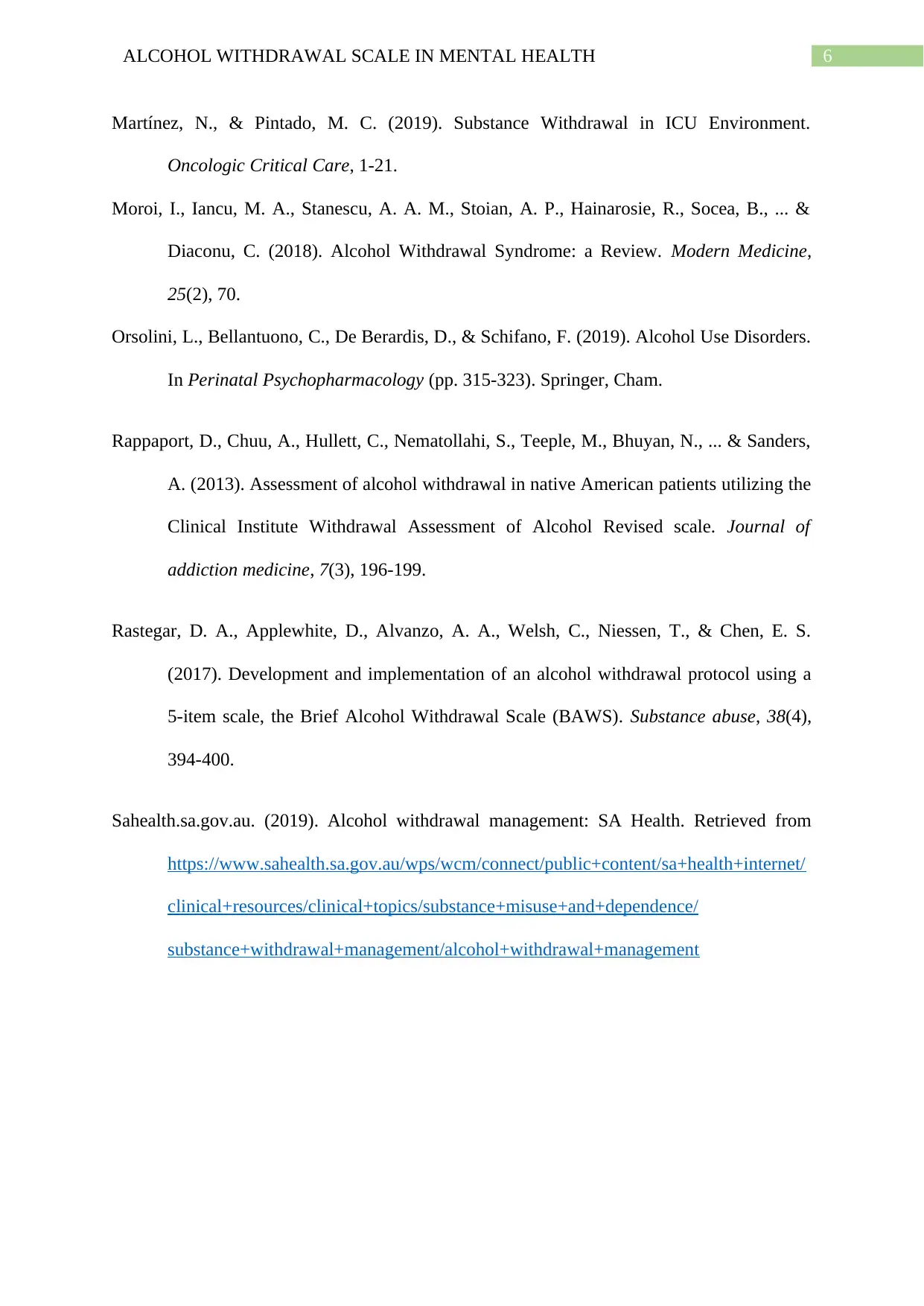
6ALCOHOL WITHDRAWAL SCALE IN MENTAL HEALTH
Martínez, N., & Pintado, M. C. (2019). Substance Withdrawal in ICU Environment.
Oncologic Critical Care, 1-21.
Moroi, I., Iancu, M. A., Stanescu, A. A. M., Stoian, A. P., Hainarosie, R., Socea, B., ... &
Diaconu, C. (2018). Alcohol Withdrawal Syndrome: a Review. Modern Medicine,
25(2), 70.
Orsolini, L., Bellantuono, C., De Berardis, D., & Schifano, F. (2019). Alcohol Use Disorders.
In Perinatal Psychopharmacology (pp. 315-323). Springer, Cham.
Rappaport, D., Chuu, A., Hullett, C., Nematollahi, S., Teeple, M., Bhuyan, N., ... & Sanders,
A. (2013). Assessment of alcohol withdrawal in native American patients utilizing the
Clinical Institute Withdrawal Assessment of Alcohol Revised scale. Journal of
addiction medicine, 7(3), 196-199.
Rastegar, D. A., Applewhite, D., Alvanzo, A. A., Welsh, C., Niessen, T., & Chen, E. S.
(2017). Development and implementation of an alcohol withdrawal protocol using a
5-item scale, the Brief Alcohol Withdrawal Scale (BAWS). Substance abuse, 38(4),
394-400.
Sahealth.sa.gov.au. (2019). Alcohol withdrawal management: SA Health. Retrieved from
https://www.sahealth.sa.gov.au/wps/wcm/connect/public+content/sa+health+internet/
clinical+resources/clinical+topics/substance+misuse+and+dependence/
substance+withdrawal+management/alcohol+withdrawal+management
Martínez, N., & Pintado, M. C. (2019). Substance Withdrawal in ICU Environment.
Oncologic Critical Care, 1-21.
Moroi, I., Iancu, M. A., Stanescu, A. A. M., Stoian, A. P., Hainarosie, R., Socea, B., ... &
Diaconu, C. (2018). Alcohol Withdrawal Syndrome: a Review. Modern Medicine,
25(2), 70.
Orsolini, L., Bellantuono, C., De Berardis, D., & Schifano, F. (2019). Alcohol Use Disorders.
In Perinatal Psychopharmacology (pp. 315-323). Springer, Cham.
Rappaport, D., Chuu, A., Hullett, C., Nematollahi, S., Teeple, M., Bhuyan, N., ... & Sanders,
A. (2013). Assessment of alcohol withdrawal in native American patients utilizing the
Clinical Institute Withdrawal Assessment of Alcohol Revised scale. Journal of
addiction medicine, 7(3), 196-199.
Rastegar, D. A., Applewhite, D., Alvanzo, A. A., Welsh, C., Niessen, T., & Chen, E. S.
(2017). Development and implementation of an alcohol withdrawal protocol using a
5-item scale, the Brief Alcohol Withdrawal Scale (BAWS). Substance abuse, 38(4),
394-400.
Sahealth.sa.gov.au. (2019). Alcohol withdrawal management: SA Health. Retrieved from
https://www.sahealth.sa.gov.au/wps/wcm/connect/public+content/sa+health+internet/
clinical+resources/clinical+topics/substance+misuse+and+dependence/
substance+withdrawal+management/alcohol+withdrawal+management
1 out of 7
Related Documents
Your All-in-One AI-Powered Toolkit for Academic Success.
+13062052269
info@desklib.com
Available 24*7 on WhatsApp / Email
![[object Object]](/_next/static/media/star-bottom.7253800d.svg)
Unlock your academic potential
Copyright © 2020–2026 A2Z Services. All Rights Reserved. Developed and managed by ZUCOL.




